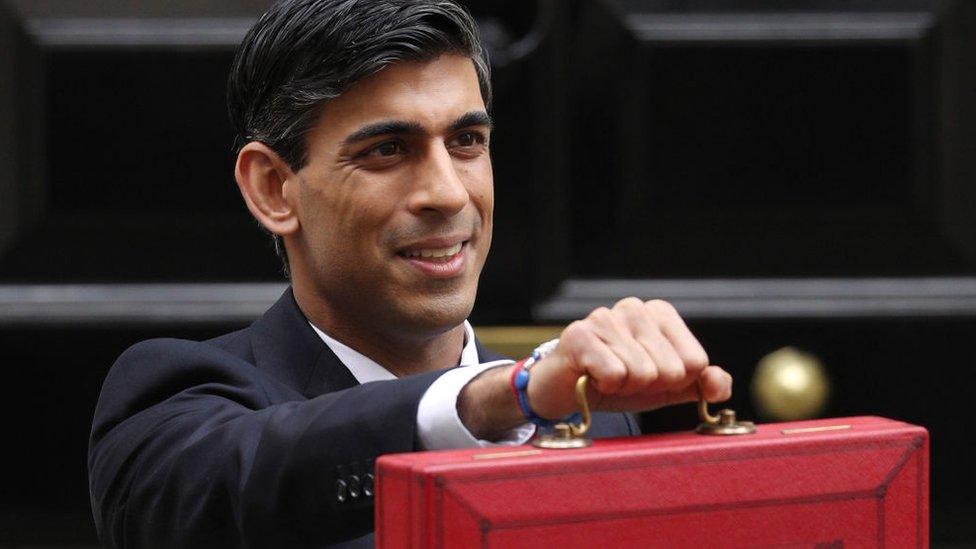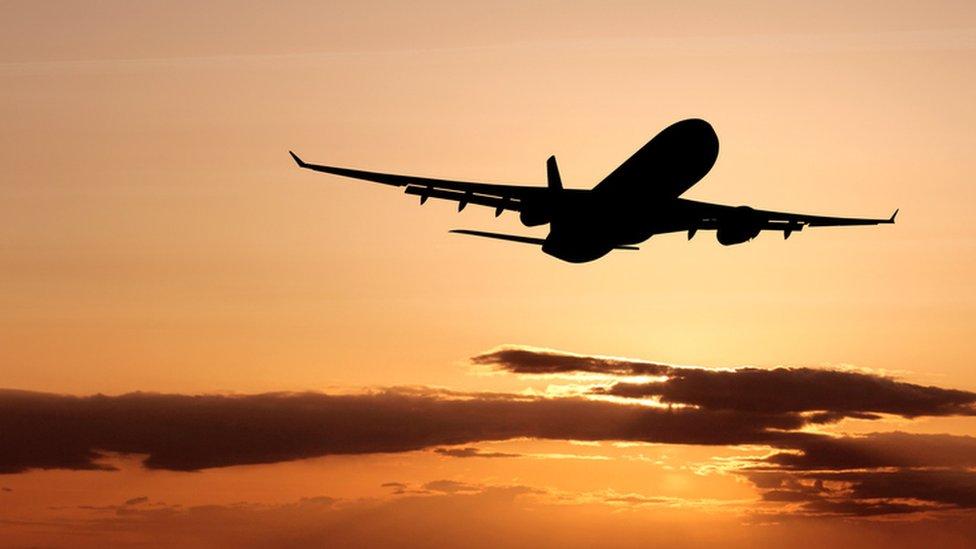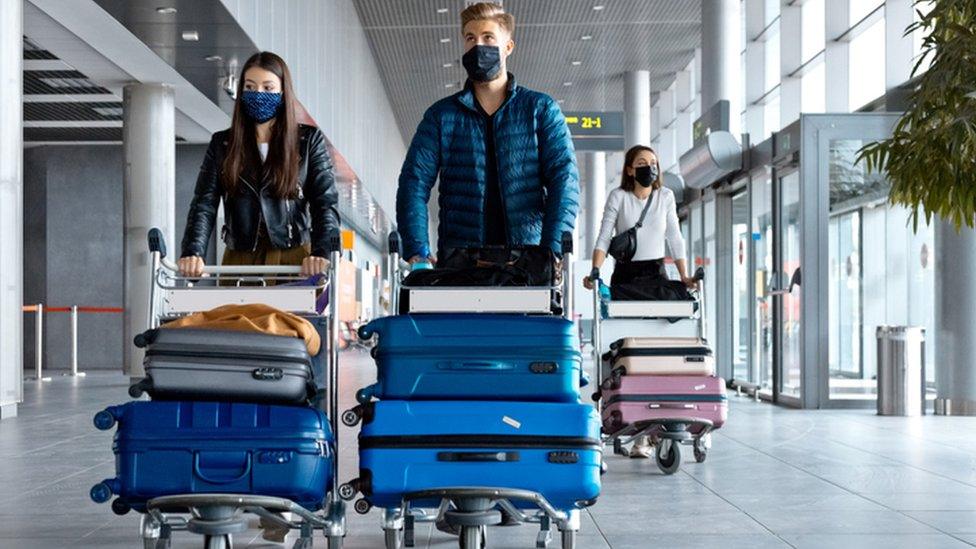Tackling the bulging Budget inbox
- Published

Chancellor Rishi Sunak is under a lot of pressure as he prepares this year's budget
Messages with advice, industry demands and desperate pleading are piling up at 11 Downing Street ahead of the Budget.
Among many industries with special pleading, airlines are alarmed at the signs that the summer travel season could be wiped out, and they're determined not to be forgotten in the route map out of lockdown.
They suffer perception problems, but are vital for business, cargo and in bringing visitors to Britain, on whom much of the hospitality sector depends.
Rishi Sunak is under a lot of pressure. It's one of the consequences of an economy that is leaning very heavily on government.
That makes firms into lobbyists and supplicants, begging for help, or demanding it, in the Budget on 3 March.
Ahead of a budget in normal times, I only hear from a few lobby groups, invariably led by whisky distillers wanting duty cut. But if my email inbox is any indication, the chancellor is getting inundated.
For a small sample, so far this week, the Institute for Fiscal Studies has said he should extend support for the economy, but also signal when they'll be tapered off.
It says this isn't the time to raise taxes, but it's time for the Treasury to be planning for that to start.
The Institute for Public Policy Research is urging an even bigger splurge.
To match the scale of President Biden's plans, it says there should be a four-fold increase in spending on economic recovery, to reach £190bn. To match Canada or Germany, it would mean nearly doubling the current commitment.
The House of Commons' Treasury committee wants to see more income support for freelancers, the newly self-employed and company directors.
Another cross-party group of MPs say the Chancellor must "act or face the extinction of the night-time economy". The events industry, including live music, with numerous freelance workers, is stepping up its lobbying pressure.
'Grow back better'
Yet more MPs on the environment audit committee have combined to say there should be VAT reductions to encourage energy efficiency, the use of recycled materials, and repair services, among plans to "grow back better" after Covid-19.
They are coy about the same argument suggesting there should be more tax on home heating fuel, petrol and diesel.
Industry lobby groups are weighing in with special pleading, both for more support, but also to influence the roadmap out of Covid-19 restrictions, to be set out by Boris Johnson on Monday. Nicola Sturgeon sets out her framework the next day.
Among those with growing signs of desperation is aviation, dealt another, severe blow by the introduction of expensive hotel quarantine.

The very slim chance of opening up travel for Easter holidays has hit the industry hard, both for outbound and for staycations.
Even the May bank holidays look a stretch for air travel. Ministers north and south are not advising bookings for summer holidays either.
With that background, rival airlines are pooling their efforts to push for inclusion in the roadmap.
Chief executives of five British airlines jointly briefed the media on the case this morning, fearing that they are seen as the root of an infection-spreading problem rather than a vital cog in the economic machinery, and one that has done its bit to ensure safety while people are in transit.
'Seminal moment'
Virgin Atlantic boss Shai Weiss said: "This is a seminal moment. It's not often you have the entire industry - airlines, competitors, airports - united with one common goal."
Jonathan Hinkles of Loganair suggested it could take between one and three months to get operations going again, with recruitment and safety training, so they need advance notice. The longer haul the flights, the longer the preparation time.
They are looking for air corridors, linking countries with high vaccination rates such as Israel, and before long, the USA, plus those with lower infection rates such as Greece and Cyprus.
They accept the need for pre-flight testing, but they see high-cost quarantine as the biggest block to bookings. Even those measures deemed necessary for a safe restart should be withdrawn when no longer necessary, observed one.

Even with more flights allowed, the ask is for furlough to continue at least until October, and for reduction of air passenger duty.
'Patchwork quilt'
And asked about a tougher approach taken to quarantine in Scotland, Mr Hinkles observed that a "patchwork quilt" is little help with infection control.
As things stand, the Scottish government is pushing for the UK one to help it enforce a tougher regime on hotel quarantine for inbound international travellers.
Along with the boss of Jet2, the chief of the Glasgow-based airline warned there were consequences. "The devolved governments, whether in Scotland, Wales or Northern Ireland, have all got to be conscious about diverting aviation out of their airports into a regime that is less onerous in neighbouring parts of the UK," said Mr Hinkles.
"I think there's a real risk of that happening. That isn't in the interests of consumers, of public health and most certainly doesn't help the economy."
Twin problems
The industry suffers twin problems of perception. One is that it spreads infection by moving people around the world at speed. The other is that it's for going on holiday, and such foreign fun and frivolity is a long way down the list of priorities this year.
Of course, aviation does a lot more than that, including business travel for sales and getting skilled workers where they are needed, as well as family links and cargo, which often relies on passenger jets to provide spacious underbellies.
It's telling that the case being made for aviation makes much less of inbound tourism.
That's not significant for sun-seeking passengers on Tui or Jet2. But only when a journalist raised that in the media briefing did the chief executives remember that arrivals at Britain's airports are vital to a huge number of hospitality jobs on the ground.
- Published12 February 2021
